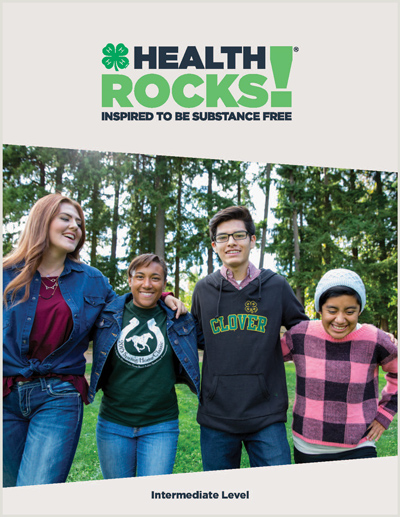
North Carolina State University 4-H is proud to offer Health Rocks!® as a collaboration with National 4-H Council.
Each year, this program reaches 5,000 youth in North Carolina to provide tobacco, alcohol, and drug prevention education for youth ages 8-14. We are one of eight states participating in this national grant. Health Rocks!® is a research-based 4-H Healthy Living Program that educates youth on responsible and healthy lifestyle choices.
- Reduce youth smoking and tobacco use.
- Help youth build life skills which lead to healthy living choices with special emphasis on youth smoking and tobacco use prevention.
- Help youth understand the influences and health consequences of tobacco, drug, and alcohol use to make healthy life choices.
- Engage youth and adults in partnership to develop and implement community strategies that promote healthy lifestyle choices.
- Build positive, enduring relationships, with youth involved as full partners through widely varying “communities of interest” to address youth risk behaviors.
By participating in Health Rocks!®, you have the opportunity to positively impact youth and improve the health of your community. If that’s not enough, we may help motivate you with these benefits!
- Free Curriculum (aligns with NC Essential Standards)
- Free Training with NC State University
- Access to digital classroom resources (videos, slide decks, etc.) for synchronous & asynchronous learning
- Professional development webinars
- Opportunity for 2+ Continuing Education Units
- Data reports specific to your programming locations
National Health Education Standards
These standards were developed by the Joint Committee on National Health Education Standards sponsored by the American Cancer Society. They provide program goals for all grade levels. Each activity in the curriculum identifies the health education standard being addressed.
Standards & Outcomes
- Students will comprehend concepts related to health promotion and disease prevention to enhance health.
- Students will analyze the influence of family, peers, culture, media, technology, and other factors in health behaviors.
- Students will demonstrate the ability to access valid information and products and services to enhance health.
- Students will demonstrate the ability to use interpersonal communication skills to enhance health and avoid or reduce health risks.
- Students will demonstrate the ability to use decision-making skills to enhance health.
- Students will demonstrate the ability to use goal-setting skills to enhance health.
- Students will demonstrate the ability to practice health-enhancing behaviors and avoid or reduce health risks.
- Students will demonstrate the ability to advocate for personal, family, and community health.
North Carolina Health Education Standards for Healthful Living
Grades 3-5
- 3.MEH.1 Understanding positive stress management strategies.
- 3.MEH.2 Understand the relationship between healthy expression of emotions, mental health, and healthy behavior.
- 3.PCH.1 Understand wellness, disease prevention, and recognition of symptoms.
- 3.ICR.1 Understand healthy and effective interpersonal communication and relationships.
- 3.ATOD.2 Apply strategies involving risk reduction behaviors to protect self and others from the negative effects of alcohol, tobacco, and other drugs.
- 4.MEH.1 Apply positive stress management strategies.
- 4.ATOD.1 Understand the health risks associated with the use of tobacco products.
- 4.ATOD.2 Understand why people use tobacco products.
- 4.ATOD.3 Apply risk reduction behaviors to protect self and others from alcohol, tobacco, and other drug use.
- 5.MEH.1 Apply positive stress management strategies.
- 5.ATOD.1 Understand the health risks associated with the use of alcohol.
- 5.ATOD.2 Understand why people use alcohol.
- 5.ATOD.3 Apply risk reduction behaviors to protect self and others from alcohol use.
Grades 6-8
- 6.MEH.1 Apply structured thinking (decision making and goal setting) to benefit emotional well-being.
- 6.MEH.2 Analyze the potential outcome of positive stress management techniques.
- 6.ATOD.1 Analyze influences that use alcohol, tobacco, and other drugs.
- 6.ATOD.2 Understand the health risks associated with alcohol, tobacco, and other drug use.
- 6.ATOD.3 Apply risk reduction behaviors to protect self and others from alcohol, tobacco, and other drug use.
- 7.MEH.2 Evaluate positive stress management strategies.
- 7.ATOD.1 Understand the health risks associated with alcohol, tobacco, and other drug use.
- 7.ATOD.2 Apply risk reduction behaviors to protect self and others from alcohol, tobacco, and other drug use.
- 8.ATOD.3 Apply risk reduction behaviors to protect self and others from alcohol, tobacco, and other drug use.
- 8.ATOD.3.3 Use advocacy skills to promote the avoidance of alcohol, tobacco, and drugs by others.
- 8.ATOD.3 Apply risk reduction behaviors to protect self and others from alcohol, tobacco, and other drug use.
- 8.MEH.1 Create positive stress management strategies.
- 8.MEH.2 Evaluate how structured thinking (decision making, problem-solving, goal setting) benefits emotional well-being.
- 8.ATOD.1 Analyze influences related to alcohol, tobacco, and other drug use and avoidance.
- 8.ATOD.2 Understand the health risks associated with alcohol, tobacco, and other drug use.
- 8.ATOD.3 Apply risk reduction behaviors to protect self and others from alcohol, tobacco, and other drug use.
- 8.ATOD.3.3 Use advocacy skills to promote the avoidance of alcohol, tobacco, and drugs by others.




